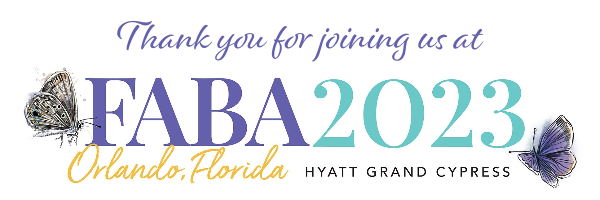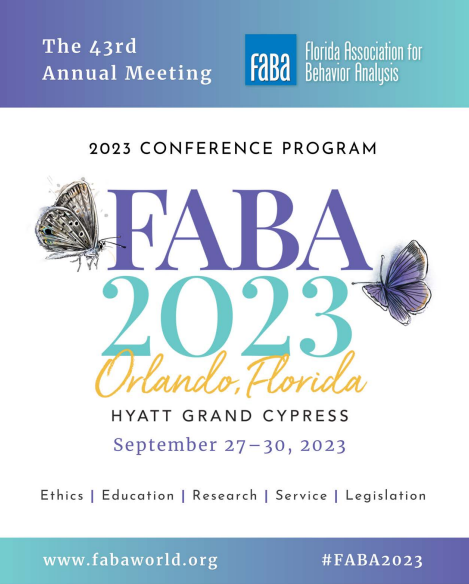
43rd Meeting of the Florida Association for Behavior Analysis
September 27-30, 2023

FAQ’s
How do I receive CEUs? After the conference, we will process and "release" all CEUs. When that happens, if you are seeking MH/PSY CEUs, you will be able to log into BehaviorLive, go to CEU History and view that certificate. Once you pay the fee for those CEUs (in CEU History), you will be able to download your certificates. We will send follow-up instructions when this is ready.
Is there a waitlist for in-person registrations? In-person registrations are closed at this time. No additional in-person registrations or waitlist requests will be accepted. On-site registrations are not available this year. You must be previously registered for in-person attendance in order to attend in person.
How do I access the member discount? If you are planning to purchase tickets using a member discount, you must 1) have an active membership before registering and 2) be logged into that account. If you are unsure of your membership status or have multiple accounts (work email, personal email), please contact us at [email protected] prior to attempting to register. We cannot retroactively apply membership discounts after the ticket has been purchased. Discounts will end after September 15, 2023.
When is FABA? As in previous years, FABA will open with workshops on Wednesday, September 27, 2023 and break-out sessions occurring on Thursday, September 28th, Friday, September 29th, and Saturday, September 30th. Break out session presenters should plan to be available September 28-30, 2023 but we encourage you to join us for pre-conference workshops on the 27th.
How do I submit a presentation proposal to FABA? The Call for Papers has closed for FABA 2023.
When is the deadline to submit a presentation? All types of presentations (including posters) to be considered for FABA were due to be submitted by June 2, 2023, at 11:59 PM.
When should I expect an acceptance notification? Email notifications will be communicated beginning immediately and no later than July 1, 2023. Correspondence will be sent to the email address(es) provided in the submission.
How do I collect CEUs? FABA will be using BehaviorLive for CEU certificate tracking and delivery this year. In-person attendees should download the BehaviorLive app from the Apple AppStore or Google Play Store before attending the conference. If you are attending online, please log in and follow the on-screen instructions. Find out more here: https://support.behaviorlive.com/hc/en-us/articles/360052296874-Attendee-Quick-Reference-Guide
Can we still register now and pay later? Some organizations require an invoice to be submitted prior to payment. If your organization requires this step, please contact us at [email protected] to set up your registration. This must be requested via email no later than August 1, 2023, and payment must be completed by August 31, 2023. No pay-later requests will be able to be processed after August 1.
When will workshops and pre-conference event tickets begin to be sold? You may add workshop tickets to your conference registration here: https://behaviorlive.com/faba/workshops
Do FABA members receive a discount for the hotel room block this year? FABA members are eligible for a conference rate at the Hyatt Regency Grand Cypress Resort. Click here to book through the conference room block with special, member pricing.
How do I request a refund? Refund requests must be submitted by August 31. Cancelations will not be honored after this date, but you may still switch your in-person registration to virtual registration up until the day before the conference.
Conference Details:
Highlights
Tuesday, September 26
5:30 pm - 7:00 pm - FABA Store and Packet Pick Up
Wednesday, September 27
8:00 am - 6:00 pm - FABA Store and Packet Pick Up
9:00 am - 12:00 pm - Workshops
12:00 pm - 3:00 pm - Exhibitor Check-in and Set Up
1:00 pm - 5:00 pm - Workshops
6:30 pm - 9:30 pm - Welcome Reception
Thursday, September 28
7:00 am - 5:00 pm - FABA Store and Packet Pick Up
8:00 am - 5:20 pm - Sessions
5:30 pm - 6:30 pm - Presidential Poster Session
Friday, September 29
7:00 am - 5:00 pm - FABA Store and Packet Pick Up
8:00 am - 5:20 pm - Sessions
8:00 pm - 11:00 pm - Ignites @ Nite & Friday Night Social
Saturday, September 30
7:00 am - 11:00 am - FABA Store and Packet Pick Up
8:00 am - 11:50 am - Sessions
Host Hotel
Hyatt Regency Grand Cypress
One Grand Cypress Blvd, Orlando, FL, 32836, US

Events and Dates
September 27-30, 2023, with pre-conference workshops on Wednesday, September 27.
Conference Registration Fees
In-person tickets are only available via advance registration. These have sold out in the last few years, so it is highly encouraged to purchase your tickets as soon as possible. There is also a virtual, live-stream option hosted by our friends at BehaviorLive.
Advance Registration will be available for the following packages through Friday, September 15:
| Professional Member Advance Registration |
$250 |
| Student / Direct Care / Parent Member Advance Registration |
$145 |
| Non-Members Advance Registration |
$360 |
| Advance Workshop Ticket (each) (BA CEUs included for workshop) |
$95 |
| Behavior Analysis CEU Package |
$100 |
Virtual Registration Only will be available after Friday, September 15:
| All Virtual Registration (after 9/15) |
$360 |
| Workshop Ticket (each) (BA CEUs included for workshop) |
$95 |
| Behavior Analysis CEU Package |
$100 |
*Pricing is automatically applied based on membership status at the time of registration. No additional discount code is necessary to receive pricing discounts. Please ensure that your membership is current at the time of registration. We are unable to refund the price difference after registration is complete.
When to Arrive and Leave
The conference break out sessions officially begin on Thursday, September 28, 2023 at 8 AM, and conclude on Saturday, September 30 at 12:00 pm. FABA's Pre-Conference workshops will be held on Wednesday, September 27th and require an additional ticket purchase.
Most attendees will want to arrive by Wednesday evening in order to attend the Welcome Reception and the Annual special session that has been held by the BACB the past six years as a method to deliver pertinent updates to the members of FABA.
If you would like to take advantage of the full conference event, departure travel should be planned for Sunday, October 1. We encourage all attendees to experience the full conference.
Registration Cap
This year, we will be capping registration at 1,800. This number is determined by the Fire Marshal as the maximum number of people who can exit the conference area in the event of an emergency. Please avoid attempts to attend the social events only without registering for the event to limit overcrowding. Please also plan to wear or display the conference name badge to security should you be prompted to do so.
On-Site Registration
FABA does not offer on-site registration. This event is for preregistered attendees only.
Transportation
Below is information about the distance to several airports as the hotel does not offer a shuttle.
International airports near Orlando, FL:
Domestic airports near Orlando, FL:
Parking
Both Valet parking ($45) and self-parking ($10-hotel guests/$30-drive-in guests) are available at the hotel, but these rates are subject to change. An additional overflow lot is located further away from the hotel with free parking subject to availability. FABA does not validate, reimburse, or offer additional discounts on parking rates.
Weather/Conference Attire
In September, the temperature is an average high of around 90 degrees, with an average low around 75 degrees. Meeting room temperatures tend to be cold. Please bring a light sweater or jacket to all meetings.
Visas
Should you require an invitation letter for a Visa application for travel to the U.S. to attend the conference, please forward proof of your conference registration to [email protected] so that a letter can be issued to you.
Accessibility for Registrants with Disabilities
FABA is committed to providing an outstanding experience for all participants. We strive for full access to the activities of these events based on an awareness of participants' needs and appropriate planning. Accessibility accommodations relating to mobility, hearing, vision or other areas may be provided.
We ask that requests for reasonable accommodations requests be made as early as possible, and well in advance of the event, so we may best accommodate individual needs and requirements. Onsite requests will be accommodated to the best of our ability; however, available resources may be limited. You will see the opportunity to express your needs during the registration process as we are here to ensure a comfortable and accessible conference experience.
For questions or concerns about accessibility at this year’s conference, please contact [email protected]
Session Room Behavior
Extensive planning goes into scheduling sessions in appropriately sized rooms; however, the popularity of sessions is not always predictable, and overcrowding occasionally occurs. If a session room reaches capacity, attendees must follow the instructions provided by FABA staff, host hotel Regency staff, volunteers, or security staff. Attendees may be instructed not to stand against the walls or block the aisles or doors, or they may be denied entry if the room is too crowded. FABA is obligated to abide by the guidelines established by the Fire Marshal. If a room reaches full capacity and we do not have your cooperation, the Fire Marshal has the authority to delay or even terminate the session until any problem has been satisfactorily corrected. Please be courteous and respectful to staff and student volunteers when you are directed elsewhere.
Attendees are asked to be respectful of their fellow attendees and to be mindful of potential disruptions during sessions, such as eating food, use of phones or other mobile devices, or the presence of infants and children. Phones and other mobile devices should always be silenced. Attendees should not be photographing presentation slides unless explicit permission has been granted by the presenter(s); please respect the Recording Policy. Further, due to contractual obligations with both speakers, invited presenters, hotel management, and virtual presentation companies, no recording is allowed in sessions including during Ignites and social events without written approval of the Program Chair. Approval is contingent upon disclosing the purpose for the recording as well as adding a disclaimer that content is not endorsed by FABA.
Presentation Content and Feedback
Through the process of the Call for Papers, all submissions that included an abstract, title, learning objectives, data, and speaker qualifications are reviewed by over 35 independent reviewers from the field. These reviewers are volunteers from across the state that consist of practitioners and researchers as FABA aims to provide the highest quality, state-of-the-art research findings for attendees. However, FABA does not individually vet the specific content of each live presentation in advance of the event. Therefore, FABA is not responsible for the content a presenter may choose to deliver during a live or pre-recorded presentation nor can the FABA Program Committee guarantee that a presentation includes all relevant facts, data, or the most up-to-date research. FABA is not liable in the event that omissions or errors occur. However, FABA also affords attendees and members the opportunity to deliver feedback to each presenter through session ratings and feedback narratives immediately upon the conclusion of the session. FABA also provides the email address for each speaker at the conference printed in the conference Program to facilitate an attendee's direct communication with the presenter of concern. In line with the BACB's Ethics Code for Behavior Analysts, FABA encourages attendees to deliver immediate feedback directly to presenters should the need arise and, as always, please reach out to the Program Chair should you need additional clarifications or support.
|